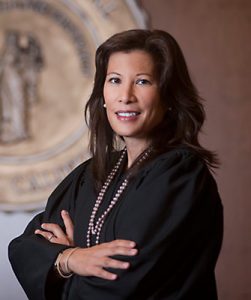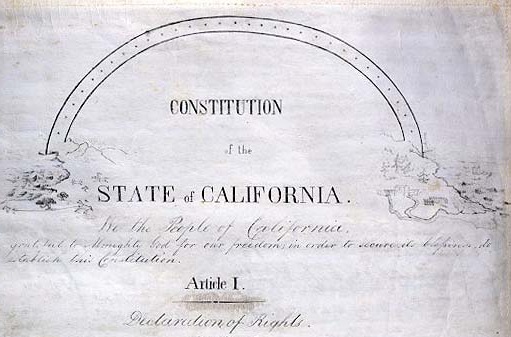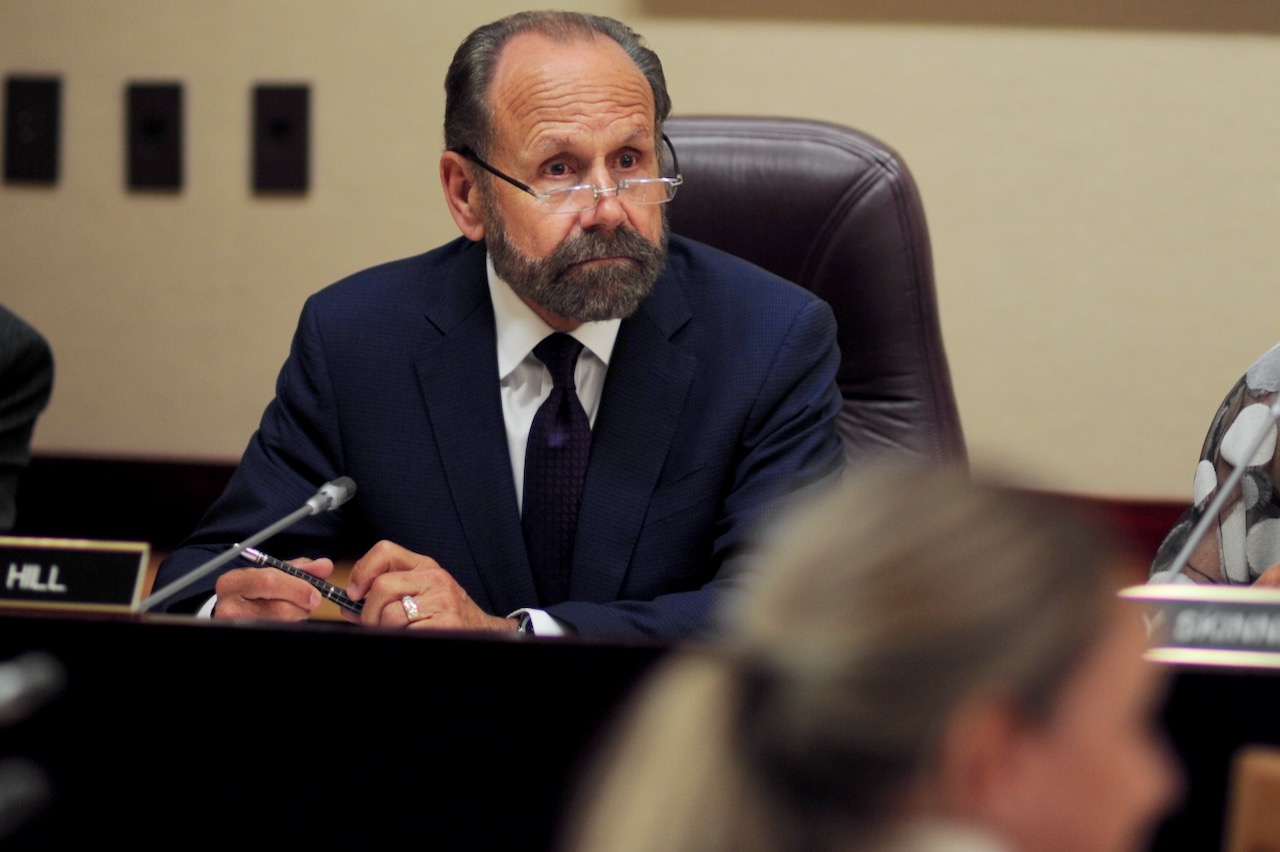
Governor Gavin Newsom. (Photo: Kevin Sanders for California Globe)
California Eviction Ban Backstory Reveals No Separation of Powers
The judiciary may not ignore the law or make it
By Wayne Lusvardi, July 6, 2020 2:06 am
Press play to hear a narrated version of this story, presented by AudioHopper.
The front story in the mainstream media regarding Gov. Newsom’s ban on residential evictions — Coronavirus Emergency Executive Order N-28-20 — is that his appointed Judicial Council has extended the ban past the initial 90 days until August 3.
However, there is no likelihood the ban will be terminated before the November election, given the state-caused increase in unemployment hovering around 20 percent (602,600 new unemployed) as of May in L.A. County. The unemployment rate last May was 4.5 percent in L.A. County. But the backstory to the governor’s eviction ban has not been told.

On June 10, the California Judicial Council recommended the eviction ban be lifted. But the head of the Council – state supreme court chief justice Tani G. Cantil-Sakauye – refused the recommendation of the Council to let the eviction ban expire. Judge Cantil-Sakauye’s decision was based on: “The judicial branch cannot usurp the responsibility of the other two branches to deal with the myriad impacts of the pandemic.”
Sakauye was persuaded by low income housing advocates and a UCLA study that claimed letting the order expire would result in mass homelessness. But did Cantil-Sakauye have constitutional authority to do so?
The UCLA Luskin Institute on Inequality and Democracy released an exaggerated report on May 28 – UD Day: Impending Evictions and Homelessness in Los Angeles, estimating 365,000 residential evictions in L.A. County alone resulting from coronavirus shutdowns. UD means Unlawful Detainer or eviction. That would reflect about 60 percent of the newly unemployed in LA County.
However, according to the Santa Monica Lookout, only about 5 percent of tenants were refusing to pay rent or were not paying full rent as of April. Moreover, the UCLA study ignored that about $5.3 billion in unemployment benefits was processed in California by May 2020.
Apparently, there was no consideration of the moral hazard that allowing tenants a free ride on rent for, say, six months will only create a worse hardship. That six months back rent will become due and payable, either at once or repaid over time.
Here is another California overkill policy, like the coronavirus shutdowns, where because of a few rent non-payers, who have powerful political symbolism, all landlords must suffer, and some may lose their properties. Landlords live off of slim margins with overall rates of return in California of about 3 percent per year.
Who Is the Judicial Council?
This raises the question: Who is the Judicial Council that recommended the eviction ban be repealed?
The Judicial Council is a 21-person panel composed of trial judges (10), state bar representatives (4), legislative representatives (2), appeals court judges (3) and the state supreme court (2). The Council has been delegated the responsibility to rule on the legal aspects of Gov. Gavin Newsom’s emergency orders related to the so-called coronavirus epidemic.
Thirteen of the active members of the Judicial Council were appointed by Republican governors, including Cantil-Sakauye, who recently switched her party affiliation from Republican to Independent over her apparent feminist opposition to confirmation of Brett Kavanaugh as a U.S. Supreme Court Justice. The Judicial Council is apparently the only statewide government body that has a majority of Republican representation, although judges typically abstain from partiality.
The Council’s Constitutional authority extends only to purely administrative policy, not public policy matters. But, in this case the governor has delegated legal interpretation and policy advice of his emergency orders to the Judicial Council.
Chief Justice Cantil-Sakauye was arguably acting not in the role of legal umpire in her decision to allow the eviction ban to continue, but stated she was influenced by policy consequences. And that is not the role of a chief justice nor the head of the Judicial Council. Her role is to balance the three powers of government – executive, legislative and judicial – but she was arguably remiss in doing so.
If Cantil-Sakauye had abstained, the Legislature would have had to act on the matter anyway. Why didn’t Sakauye just refuse to allow her Judicial Council to render policy decisions on this matter? Now that she has crossed that invisible separation of powers line, how does she credibly issue any decisions in her role as chief justice?
Constitutional Legal Challenge
A lawsuit filed June 15 by the Pacific Legal Foundation (PLF) – Christensen vs. California Judicial Council – on behalf of two landlords challenges the Judicial Council’s authority to continue the eviction ban:
- “The California Constitution’s separation of powers prevents government agencies like the California Judicial Council from overriding the legislature and governor to take the law into its own hands and make social policy.”
- “Government cannot deprive landlords of their right to evict tenants who are able to pay rent yet refuse to do so, crippling their businesses and handicapping their ability to help tenants who face financial hardship.”
PLF Attorney Michael Poon said about the case: “This is not only grotesque policy, it is unconstitutional. Under the American system of separation of powers, the judiciary may not ignore the law or make it. This rule does both.”
So, the back story is that Gov. Newsom’s delegation of implementation of the eviction ban to the Judicial Council is allegedly unconstitutional. But will this case take longer than the November elections to adjudicate? And how could the California Supreme Court rule on this issue now that they have compromised themselves? And could the U.S. Supreme Court act in a timely way or would they side-step the issue?
The effort to recall Gov. Newsom, not coincidentally, started to gain momentum around June 28.
- Peter Gleick’s National Water Plan for California - October 12, 2020
- Court Opens Up Big Prop.13 Loophole for ‘Public Franchise Fees’ - October 2, 2020
- New Cal Grid CEO is Ex-Enron Green Power Trader - September 29, 2020





On April 6, 2020, the California Judicial Council (CJC) issued Emergency Rules which prohibited evictions until 90 days after the Governor declares the “State of Emergency “over”. The Judicial Council is the policymaking body of the California courts established by an amendment (article VI) to the CA Constitution in 1926. CJC is responsible for ensuring the consistent, independent, impartial, and accessible administration of justice. I assume this includes enforcing contract law for both tenants and landlords!
However, CJC’s order has stopped evictions that are both Covid or non-Covid related. This order and the resultant sustained closure of court houses has inflicted immeasurable harm to ‘mom and pop’ landlords, taken away their constitutional rights, and threatened them with financial and emotional ruin. My family is one of them!
On June 9, the Judicial Council Prepared to Repeal COVID-19 Rules on Evictions, Bail “These rules achieved their goals—to reduce harm, save lives, and help ‘flatten the curve’ of the pandemic,” Martin Hoshino, administrative director of the Judicial Council. . “As a result, 51 California counties and our courthouses have started a phased, safe reopening. A statewide rule no longer serves our need to be flexible and responsive based on local health conditions.”
On June 9, David Chiu, Assemblymen wrote a letter to the Judicial Council and Chief Justice Cantil-Sakauye strongly urging the Judicial Council to not rescind the emergency rules until Dec. 31, 2020. He tweeted victory to his followers and included the letter shown below to prove that he ‘did it’.
On June 10, 2020, the Chief Justice suspended the vote and said: “I believe the executive and legislative branches will need more time to sort through various policy proposals.” How is this the concern of an independent judiciary?
On July 1 the CA Supreme Court affirmed their independence in their Code of Ethics. “Canon 1. A judge shall uphold the integrity and independence of the judiciary. Canon 2. A judge shall avoid impropriety and the appearance of impropriety in all of 18 the judge’s activities.”
An independent judiciary to uphold the law (as it stands and NOT as it might become) and protect constitutional rights? You decide!
Worse than that, Chiu actually wrote a bill which the Assembly passed (and is currently working through the Senate) that would allow tenants to withhold their rent payments up to 15 months after the state of emergency has been lifted. At this time, no one knows when the governor will lift the emergency. How can you count 15 months from an unknown date?
Face it, poor landlords. California is the pits. All three branches of the government – the executive, the legislative, and the judiciary are united in abusing us.
Our help is only from the Lord, who made heaven and earth. No one else can help us against non-paying tenants because tenants deliver more votes than us small-scale landlords.
Our only resort is to pray.
“But, in this case the governor has delegated legal interpretation and policy advice of his emergency orders to the Judicial Council. ” So had they ruled differently, would Newsom have the ba**s to remove that delegation and give it to someone else? Need I ask?
Constitution rights are a FEDERAL matter.
We won’t have justice in California.
I hear about people getting million dollar settlements for rights violations.
I want a piece of that.
I am a Landlord I have a condo I’ve been renting to the same couple for 3 years i keep the rent low to help them, May’s rent neve came just a letter saying he is unemployed do to Corona virus well I checked and he is employed June same letter also saying there going to be moving soon July same, you would think keeping there rent hundreds of lower than I could get that they would screw me. He said there going to move in with family members in New York. I wounding how I’m doing to hunt them down if they do move to New York or if it’s going to be worth it, we had to put our lives on hold until this comes to an end.
Patrick
I’ve been to eviction court many times. Those who do not pay rent always have excuses – they are out of work, they have to send money to sick relative, they are moving next month. The best landlord is one who is businesslike. Hand them a 3-day notice to pay rent or leave the premises and hire an eviction attorney to get them out. Remember, you are not their friend – you are their landlord.
Patrick, no good deed goes unpunished. Sorry to hear that.
The judiciary council has lost every bit of credibility with the decision to afford only tenants, covid impacted or not, with access to all three branches of government. Landlords are not actual citizens apparently. They don’t even deserve the right to a hearing. It was Sakauye’s own words that are so hypocritical, that access to the court is just the first step to help eliminate inequality. And here the judicial council just slammed the doors shut on our faces indefinitely with no recourse to be heard. Imagine how stifling it is, how oppressive it is to have the government force you to operate their charitable operation through your home. You dont have any say, you cant check what is going on, and in my case you dont even know who those people are because they are unknown subletters that I did not authorize to live there and my actual tenant left the home right in the middle of the emergency orders being issued. It is frustrating to be the only one being held accountable-paying mortgage payments, property taxes, utility bills while the people there are absolutely derelict of any responsibility, no decency to even communicate to us that they are covid impacted or working on a payment plan. No communication is necessary on their part, this is their understanding and who is responsible for this? The judiciary council had the opportunity to clear this up, and they abstained from this BASIC responsibility. Despicable, pathetic, overreaching body of government. Shame on you, this is 2020 California; this is worse judiciary practice than in many autocratic regimes and undeveloped nations. Outright politicization of the Courts!!!! Shame on you Sakuyaye!!!!
Call the judicial council and ask them if you can speak at their next meeting July 23.
This lack of law, forces landlords to cover the tenant rent for 6-12 months and is abuse of civil rights and property rights.
Most of these rents will never be able to be collected.
Totally agree, I’m considered landlord to have roommates anyway, and we were affected like sick with Covid affected and so what? We still have to pay mortgage and utilities insurance taxes etc. These roommates are not paying their rents. They laughed in our faces because they are not paying and they are still working not even affected and we know we live under the same roof. This moratorium has definitely violate landlords rights and property rights
In a liberal run state there is a single block of governing. No democracy exists except as a dog and pony show for the useful “geniuses”.
Patrick Esposito, that’s exactly what I wrote to the Mayor of LA. That slot of dishonest people would pocket the money even though they were working and leave the owner to go bankrupt. This is so disgusting.
Call the judicial council and ask them if you can speak at their next meeting July 23.
Noting that
Government Code section 68115 gave the Judicial
Council power to issue orders in case of an
emergency so long as the orders are not inconsistent
with statutes, the Governor ordered that, if the
Judicial Council’s emergency rules were inconsistent
with any civil or criminal procedure statute, the
impacted statutes were suspended. Pursuant to that
order, the council adopted emergency rules on
April 6, 2020. Emergency rule 1, inter alia,
prevents courts from issuing summons in unlawful
detainer actions other than to protect health and
safety.
I
Government Code section 8571 provides, in relevant
part, “During a state of war emergency or a state
of emergency the Governor may suspend any regulatory
statute, or statute prescribing the procedure for
conduct of state business, or the orders, rules, or
regulations of any state agency…. where the
Governor determines and declare that strict
compliance with any statute, order, rule, or
regulation would in any way prevent, hinder, or delay
the mitigation of the effects of the emergency.”
Petitioner complains that Governor, in authorizing
the suspension of Code of Civil Procedure section
1166, subdivision (e), violated the seperation of
powers clause of the California Constitution by
exercising legislative powers, and also violated
separation of powers by delegating to the judiciary
the authority to decide which statutes should be
suspended. The seperation of powers doctrine is
expressed in section 3 of article III of the
California Constitution, which provides: “The
powers of state government are legislative,
executive, and judicial. Persons charged with the
exercise of one power may not exercise either of
the others except as permitted by this Constitution.”
But, the separation-of-powers doctrine “does not
command ‘a hermetic sealing off of the three
branches of Goverment’ [Citation.]” (Obrien v. Jones
(2000) 23 Cal. 4th 40, 48.) The Legislature saw
fit, in enacting Government Code section 8571, to
allow the Governor in extraordinary situations
involving dire emergencies, to suspend statutes.
The Governor was not given the power to enact
substantive legislation, and the sharing of
legislative powers in Government Code section 8571
did not violate the constitution. The Governor
has not delegated his Government Code section 8571
authority to the Judicial Council. Rather, the
Governor retained, and has chosen to exercise, his
discretion to suspend a statutory provision if, as
provided in Executive Order No. N-38-20, (1) the
Judicial Council adopts a rule “necessary to
maintain the safe and orderly operation of [the]
court” in response to the COVID-19 pandemic, and
(2) that rule is inconsistent with the provision.
Untimely, the suspension of the inconsistent
provision is pursuant to the order of the Governor,
not the Judicial Council.
Got outta church but that had me thinking, I get my day in court as a ud case was filed against me my tenancy terminated can appear before California Chief Justice Tani G. Cantil-Sakauye and say I didn’t do anything, burden of proof on and I wish I countersuit for personal injury basically last time I went to court no court because coronavirus trying to see if they holding current this season really, I got court in few days, it’s 6th time I go, and be turned away without closure praying it work for the best..